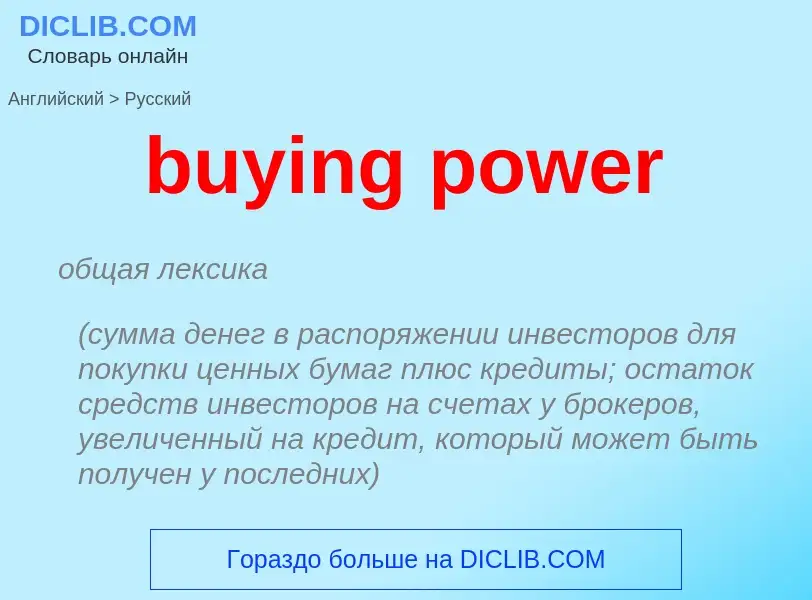Traduzione e analisi delle parole tramite l'intelligenza artificiale ChatGPT
In questa pagina puoi ottenere un'analisi dettagliata di una parola o frase, prodotta utilizzando la migliore tecnologia di intelligenza artificiale fino ad oggi:
- come viene usata la parola
- frequenza di utilizzo
- è usato più spesso nel discorso orale o scritto
- opzioni di traduzione delle parole
- esempi di utilizzo (varie frasi con traduzione)
- etimologia
buying power - traduzione in Inglese
общая лексика
(сумма денег в распоряжении инвесторов для покупки ценных бумаг плюс кредиты; остаток средств инвесторов на счетах у брокеров, увеличенный на кредит, который может быть получен у последних)
экономика
покупательная способность (стоимость денег, измеряемая способностью приобретать товары и услуги; прямо связана с уровнем потребительских и иных цен)
биржевое выражение
покупательная способность (рынка ценных бумаг)
синоним
Definizione
Процесс действия по знач. глаг.: размыкать, размыкаться.
Wikipedia
Bulk purchasing or mass buying is the purchase of much larger quantities than the usual, for a unit price that is lower than the usual.
Wholesaling is selling goods in large quantities at a low unit price to retail merchants. The wholesaler will accept a slightly lower sales price for each unit, if the retailer will agree to purchase a much greater quantity of units, so the wholesaler can maximize profit. A wholesaler usually represents a factory where goods are produced. The factory owners can use economy of scale to increase profit as the quantity sold increases.
Retailing is buying goods in a wholesale market to sell them in small quantities at higher prices to consumers. Part of this profit is justified by logistics, the useful distribution function of the retailer, who delivers the goods to consumers and divides those large quantities of goods into many smaller units suitable for many transactions with many small parties of consumers. Retailers can also benefit from economy of scale to increase profit, just like a wholesaler does.
Bulk purchasing is when a consumer captures part of the benefits of economy of scale by doing with the retailer what the retailer does with the wholesaler: paying a lower price per unit in exchange for purchasing much larger quantities. This allows the consumer to satisfy more of his or her demands at a lower total cost by acquiring more use value per dollar spent.
Research has shown that that simply displaying the per-unit price for an item sold in bulk would increase the adoption of bulk buying among lower-income families. This population cohort stands to reduce their supermarket expenditures by 5 percent if bulk purchasing is adopted at similar levels as higher-income cohorts.
Consumer demand for savings by bulk purchase has led to the success of big-box stores. Although effected by marginal cost, the total cost does not increase.
Bulk purchasing also enables greater resilience, such that bulk buyers are able to build stockpiles of necessities. During the COVID-19 pandemic, bulk purchasing also contributed to better health outcomes by decreasing the overall number of trips to the grocery store, thus lessening opportunities for exposure to SARS-CoV-2. Since lower-income individuals were less likely to participate in bulk buying, this likely contributed to socioeconomic-related health inequalities during the pandemic.
The bulk buying of perishables must be carefully planned and celebrated since per-unit savings can be erased if consumers purchase an excessive amount of a particular product and it spoils before it can be consumed or otherwise used.

